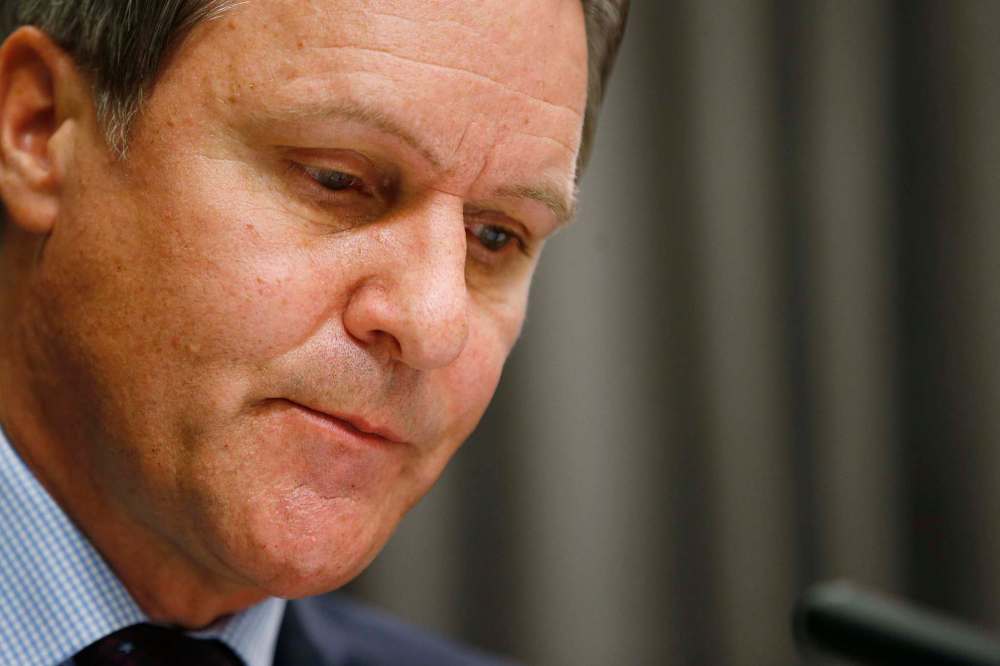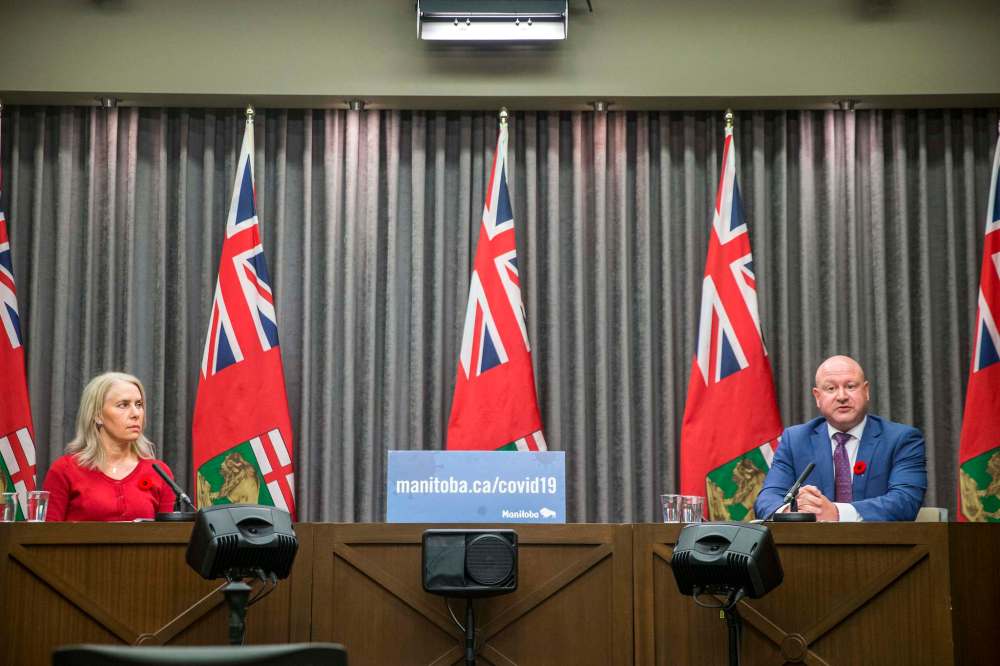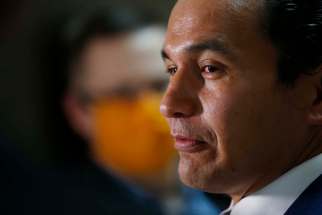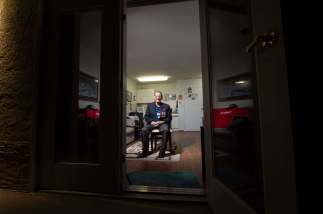Pallister government cuts exacerbate COVID crisis
Read this article for free:
or
Already have an account? Log in here »
To continue reading, please subscribe:
Monthly Digital Subscription
$1 per week for 24 weeks*
- Enjoy unlimited reading on winnipegfreepress.com
- Read the E-Edition, our digital replica newspaper
- Access News Break, our award-winning app
- Play interactive puzzles
*Billed as $4 plus GST every four weeks. Offer only available to new and qualified returning subscribers. Cancel any time.
Read unlimited articles for free today:
or
Already have an account? Log in here »
Hey there, time traveller!
This article was published 09/11/2020 (1544 days ago), so information in it may no longer be current.
Although things have been unravelling for some weeks now, it would only take about 72 hours this past weekend for Premier Brian Pallister’s boasts about Manitoba’s nation-leading pandemic response to fully come back to haunt him.
Starting Friday night and continuing well into Monday, Manitobans were treated to a series of incidents, developments and alarming admissions that revealed just how bad things are and how few ideas we have to extinguish the raging bush fire of COVID-19 that is sweeping across the southern regions of the province.
How’s this for a series of unfortunate but illuminating events?
Going into the weekend, Winnipeggers were pretty anxious about the province’s pandemic response, largely because of two different letters collectively signed by more than 200 critical care physicians warning of impending disaster unless deeper social and economic restrictions were imposed.
Health Minister Cameron Friesen tried to dismiss the physicians’ concerns as alarmist, but almost as a reminder of the cruelty of karmic justice, the already worrisome surge in COVID-19 cases at personal care facilities graduated into an all out catastrophe.
Residents at Maples Personal Care home were literally rescued by paramedics last Friday night when a severe shortage of nurses and aides left many unattended.
On Saturday, the plot thickened when Gina Trinidad, the Winnipeg Regional Health Authority’s chief operating officer of long-term care, admitted at a news conference the health authority was not adequately prepared to provide contingent staff to cover long-term care facilities in the event of multiple outbreaks.
On Sunday, Health Minister Cameron Friesen responded to the growing crisis by ordering a full investigation of the long-term care outbreaks. It was a worrisome sight: a minister of the crown flush with concern and bereft of any ideas on how to save them from the coronavirus.

And then on Monday, Dr. Brent Roussin, the chief medical officer of health, and Lanette Siragusa, the chief nursing officer, admitted they did not know how many times EMS crews had been dispatched to long-term care facilities. At the moment, 23 of Winnipeg’s 38 long-term care facilities have COVID-19 outbreaks and the number of deaths is climbing at an alarming rate.
Put all those events together, and you have a damning picture of a government that appears to have neither the competency nor capacity to battle COVID-19.
How did we go from Pallister’s “best in class” tributes to full-blown crisis? There are, no doubt, many contributing factors, but questions should be asked about whether years of austere management of the health-care system by the Pallister government is not at least partly to blame.
This is, after all, a government that announced its presence in 2016 with an arbitrary $70-million cut in funding to the WRHA and, later, an equally arbitrary 15 per cent cut in management positions. These decisions were then followed by three years of anemic funding that ran well behind the combined impacts of population growth and basic inflation.
Was this austerity a contributing factor to the WRHA’s failure to adequately plan for an outbreak at personal care homes, and similar province-wide failures to build additional capacity in testing and contact tracing? Our descent into full-blown crisis has been pockmarked by an inability to properly anticipate needs and provide solutions.

More and more, it appears Pallister has built a health-care system that has been so stripped of resources on the planning side, it can only function adequately in the absence of a crisis.
Quality health care is a combination of good service provision and good planning. Increasingly, we’re seeing evidence in Winnipeg that while front-line staff are doing as much as they possibly can under impossible circumstances, the administrative side of health care is struggling to keep up.
In particular, questions have arisen about what everyone was doing during those lazy summer months when we had few cases of COVID-19 and thus, time away from the crucible of a crisis to prepare for a second wave.
For example, Siragusa said there are more than 600 nurses in the system with some critical care training who theoretically could be called upon to augment those on the front lines of the pandemic response. However, while Siragusa said public health officials know where these nurses are located, they are still asking for volunteers to undergo refresher training before redeploying to critical care.
It’s hard to understand why a list of willing and able critical care nurses would not have already been identified. And why, over the months with very few new COVID-19 cases, those nurses would not have been given a refresher course to sharpen their critical care skills.
Certainly, the shortage of staff at long-term care facilities is likely to be felt at hospitals. Siragusa confirmed that last week alone, 44 front-line staff tested positive for COVID-19 and an aide from Victoria General Hospital had become Manitoba’s first confirmed death of a health-care worker.
As the cases and deaths pile up, one can only hope that the Pallister government has the courage to take a long, hard look at itself and ask whether its relentless drive to balance the budget, cut taxes and stuff hundreds of millions of dollars into a fiscal reserve haven’t at least contributed to the current tragedy unfolding in Winnipeg.
dan.lett@freepress.mb.ca

Dan Lett
Columnist
Born and raised in and around Toronto, Dan Lett came to Winnipeg in 1986, less than a year out of journalism school with a lifelong dream to be a newspaper reporter.
Our newsroom depends on a growing audience of readers to power our journalism. If you are not a paid reader, please consider becoming a subscriber.
Our newsroom depends on its audience of readers to power our journalism. Thank you for your support.
History
Updated on Monday, November 9, 2020 8:16 PM CST: Changes reference from one to two letters.
Updated on Monday, November 9, 2020 10:36 PM CST: Fixes multiple typos















